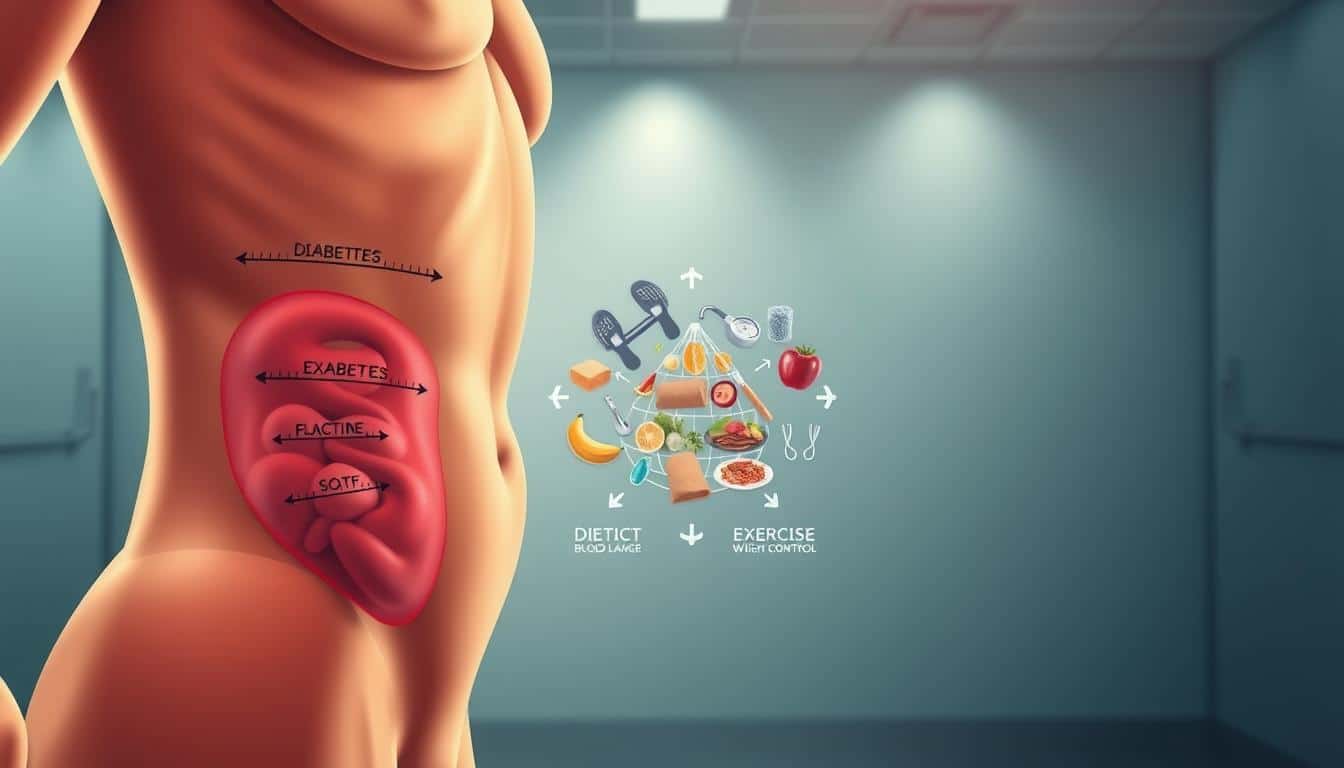Managing your health with blood sugar concerns often raises questions about body weight. Can glucose imbalances influence your waistline? The relationship between insulin, energy regulation, and metabolism plays a key role here.
When the body struggles to process glucose efficiently, it may store excess energy as fat. Treatments like insulin therapy help stabilize blood sugar but can sometimes lead to increased hunger or fluid retention. This creates a paradox: vital medications might contribute to unexpected changes on the scale.
Early stages of this condition often show the opposite effect. High glucose levels can trigger muscle breakdown and rapid weight loss before diagnosis. This dual impact makes personalized care essential for balancing health priorities.
Your journey will depend on factors like diet, activity levels, and medication types. Understanding how these elements interact helps you work with healthcare providers to optimize outcomes. Controlled blood sugar isn’t just about avoiding complications—it’s a cornerstone of sustainable weight management.
This article explores practical strategies to navigate these challenges. You’ll learn how to align treatment plans with lifestyle goals while keeping energy levels steady. Let’s break down the science into actionable steps for lasting wellness.
Understanding Diabetes and Its Impact on Weight
Your body’s energy management relies on precise communication between hormones and cells. When this system falters, every organ feels the effects. Diabetes disrupts how your organs process fuel, creating ripple effects beyond glucose control.
What Diabetes Means for Your Body
This condition occurs when your system struggles to move sugar from the bloodstream effectively. The pancreas produces insulin, which acts like a key unlocking cellular doors. If these keys malfunction or diminish, sugar accumulates while cells lack energy. This imbalance strains organs and alters how you store fuel.
The Role of Blood Sugar and Insulin
Insulin maintains steady sugar levels, ensuring consistent energy for daily functions. When cells resist insulin’s signals (insulin resistance), glucose remains trapped in circulation. Elevated levels prompt the body to store excess sugar as fat, disrupting metabolic health. Balancing this process supports vitality and long-term wellness.
Recognizing these interactions helps you make informed choices about nutrition and activity. Your cells’ response to insulin directly influences energy use and storage patterns, making awareness crucial for sustainable health strategies.
Does diabetes cause weight gain?
Balancing blood sugar levels often involves navigating unexpected shifts in body composition. While stabilizing glucose remains critical, certain treatments can reshape how your system processes energy. This creates a delicate balance between health priorities and physical changes.

Insulin Therapy: Necessary but Complex
Insulin helps cells absorb glucose, preventing dangerous spikes in blood sugar. However, this process also signals your body to store excess energy as fat. A 2023 study in Diabetes Care found that individuals using insulin therapy gained an average of 4-8 pounds within the first year.
This occurs because improved glucose absorption reduces calorie loss through urine. Your system becomes more efficient at using – and storing – energy. Working with your care team to adjust meal plans alongside insulin doses helps manage this effect.
Metabolic Shifts During Treatment
Starting medications often reverses early symptoms like rapid weight loss caused by uncontrolled blood sugar. As treatment stabilizes energy levels, your metabolic rate may slow. Research shows this adjustment period can last 3-6 months while your body adapts.
Choosing nutrient-dense foods supports steady calorie burning without excessive storage. Pairing insulin with activity-friendly medications like metformin might also help. Your healthcare provider can tailor options to align with your wellness goals while maintaining glucose control.
The Impact of Insulin and Medications on Weight
Navigating treatment options involves understanding how therapies interact with your body’s chemistry. While essential for health, some approaches carry unintended effects that require careful management.

Insulin: Benefits and Potential Side Effects
This hormone plays a vital role in regulating energy absorption. By helping cells utilize glucose, it prevents dangerous blood sugar spikes. Endocrinologists emphasize its life-saving benefits for those with insulin deficiency.
However, improved glucose uptake can increase fat storage. Lower-cost insulin types often stay active longer, raising risk of gradual weight gain. Studies show insulin analogs—modified versions with faster action—may reduce this effect by aligning better with meal timing.
Medication Choices and Their Influence on Weight
Other medications also affect energy balance. Sulfonylureas stimulate insulin production but may boost hunger signals, while GLP-1 agonists help control appetite. A 2022 review found a 5-10 pound difference in gain between common drug classes.
Discussing side effects with your care team helps tailor solutions. Pairing insulin with metabolism-supporting food choices or alternative therapies often creates better outcomes. Regular check-ins ensure your plan adapts to changing needs.
Strategies for Healthy Weight Management with Diabetes
Maintaining a balanced approach to your health requires strategies tailored to your unique needs. When managing metabolic conditions, combining nutrition and activity creates a foundation for lasting results. Small, consistent changes often yield better outcomes than drastic overhauls.
Adjusting Your Diet for Better Blood Sugar Control
Focus on balanced meals rich in fiber, lean proteins, and healthy fats. These nutrients slow glucose absorption and keep energy levels steady. Track your intake using apps or journals to spot hidden calories from snacks or sugary drinks.
Portion control matters. Studies show measuring servings reduces overeating by 20-30%. Work with a dietitian to create meal plans aligning with your preferences and health goals. This collaboration helps you enjoy food while supporting healthy weight targets.
Incorporating Exercise into Your Daily Routine
Aim for 150 minutes of moderate activity weekly. Walking after meals or swimming improves insulin sensitivity and burns calories. Even short bursts—like 10-minute yoga sessions—add up over time.
Regular physical activity helps manage blood sugar and supports losing weight safely. Pair cardio with strength training to build muscle, which naturally boosts metabolism. Always consult your care team before starting new routines to ensure safety and effectiveness.
Building a sustainable plan requires patience. Celebrate small victories, like choosing vegetables over processed snacks or completing a weekly exercise goal. Your efforts compound into meaningful, long-term health improvements.
Understanding Blood Sugar Levels and Their Role in Weight
Your body’s response to fuel plays a critical role in shaping physical health. When glucose circulates unchecked, it disrupts energy balance and storage patterns. Managing this balance requires insight into how your system processes nutrients.
How Excess Glucose Becomes Fat
Consistently high blood sugar triggers insulin to shuttle extra glucose into fat cells. Over time, this process strains your liver and muscles—organs that normally store sugar. When these storage sites fill up, surplus glucose converts to fatty acids through lipogenesis.
Research shows this mechanism contributes to obesity by increasing fat deposits around organs. Proteins involved in metabolism shift focus from breaking down nutrients to storing them. This creates a cycle where elevated levels make weight management harder.
Breaking the Insulin Resistance Cycle
Insulin resistance occurs when cells ignore signals to absorb glucose. Your pancreas then produces more insulin, worsening fat storage. To counter this, focus on foods that stabilize energy without spiking sugar.
Pairing lean protein with fiber-rich carbs slows glucose absorption. Regular activity—even light walks—improves insulin sensitivity by 30-50% over months. Monitoring your levels daily helps identify patterns needing adjustment.
Small changes create lasting impacts. Choosing whole grains over refined carbs or prioritizing sleep supports metabolic health. Work with professionals to build habits that align with your body’s needs.
Tips for Managing Weight Fluctuations and Lifestyle Changes
Adapting to metabolic changes requires teamwork between you and your care providers. Regular communication helps balance treatment effectiveness with your daily routines. Small, intentional shifts often lead to meaningful progress over time.
Working with Your Healthcare Provider
Schedule monthly check-ins to review blood sugar trends and body composition changes. Bring a journal tracking meals, activity, and symptoms to appointments. This helps your care team spot patterns needing adjustments.
The American Diabetes Association recommends updating medication doses when lifestyle habits shift. For example, increased exercise might require reduced insulin. Ask about screening for prediabetes or related conditions during visits—early detection prevents complications.
Practical Lifestyle Adjustments
Start with three manageable changes: timed meals, hydration goals, and 5-minute activity breaks. Research shows consistency matters more than intensity. Swap sugary drinks for herbal teas or infused water to cut hidden calories.
Prioritize sleep quality—poor rest disrupts hunger hormones. Use apps to monitor daily steps or stress levels. These tools help people stay accountable without feeling overwhelmed.
Remember, your journey is unique. What works for one person might need tweaking for another. Celebrate progress, not perfection, while building habits that support lasting wellness.
Conclusion
Navigating metabolic health requires balancing multiple priorities. Blood sugar control and body composition often influence each other through insulin activity and treatment choices. Medications like insulin therapy stabilize glucose but may shift how your system stores energy.
Your care plan should address both nutrition and medication timing. Regular exercise improves insulin sensitivity, helping your cells use fuel efficiently. Partnering with healthcare providers ensures adjustments align with your unique needs.
Small, consistent changes create lasting results. Track meals and activity patterns to identify what works for your body. Research shows combining lifestyle modifications with medical guidance yields better long-term outcomes than focusing on one aspect alone.
Stay proactive in monitoring progress. Open communication with your care team helps refine strategies as your health evolves. With a personalized approach, you can manage metabolic shifts while maintaining steady energy levels and wellness goals.
FAQ
How does diabetes affect body weight?
Diabetes disrupts how your body processes glucose, which can lead to insulin resistance or insufficient insulin production. This imbalance often causes energy from food to be stored as fat instead of being used efficiently, contributing to weight fluctuations.
Can insulin therapy lead to weight gain?
Insulin helps cells absorb glucose, but excess glucose not used for energy may be stored as fat. If calorie intake isn’t adjusted to match activity levels, insulin therapy might contribute to gaining weight. Work with your healthcare provider to balance doses with diet and exercise.
Which diabetes medications influence weight changes?
Some medications, like sulfonylureas or insulin, may promote fat storage. Others, such as GLP-1 agonists or SGLT2 inhibitors, often support weight loss. Discuss options with your doctor to align treatment with your health goals.
How can diet adjustments improve blood sugar control?
Prioritizing low-glycemic foods like non-starchy vegetables, lean proteins, and healthy fats helps stabilize glucose levels. Reducing refined sugars and portion sizes also minimizes spikes, making it easier to maintain a healthy weight.
Why does high blood sugar contribute to fat storage?
When glucose isn’t absorbed by cells due to insulin resistance, it remains in the bloodstream. Over time, excess glucose is converted into triglycerides and stored in adipose tissue, increasing body fat.
What lifestyle changes help manage insulin resistance?
Regular physical activity, stress reduction, and adequate sleep enhance insulin sensitivity. Combining aerobic exercises with strength training optimizes metabolism, while mindful eating habits prevent overconsumption of carbs.
How often should you consult a healthcare provider about weight changes?
Schedule check-ups every 3–6 months to review your treatment plan, especially if you notice unexpected shifts in body weight. Your provider can adjust medications or suggest personalized strategies for sustainable management.
Can losing weight reverse prediabetes?
Shedding 5–7% of body weight through diet and exercise significantly lowers blood sugar levels in many cases. This approach improves insulin sensitivity and may delay or prevent progression to type 2 diabetes.


